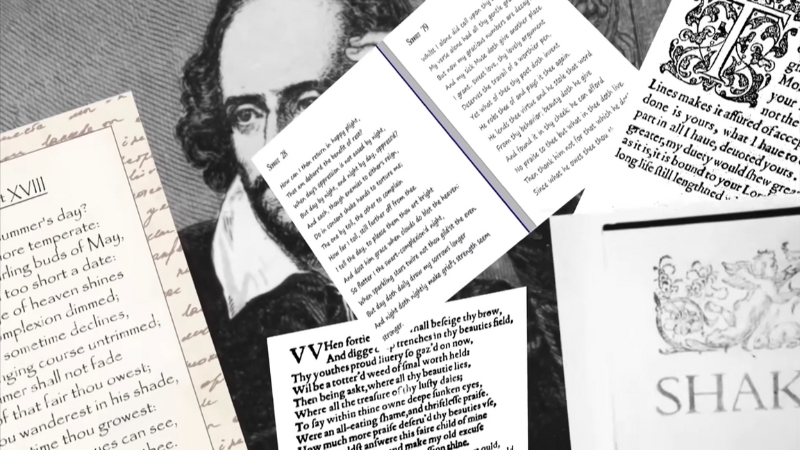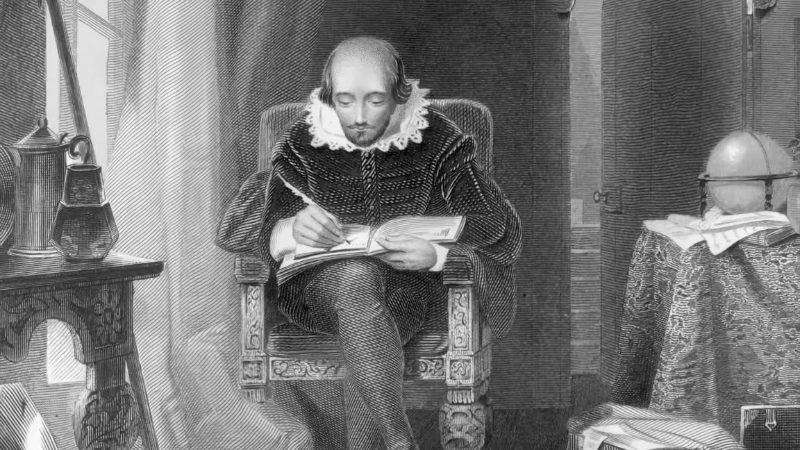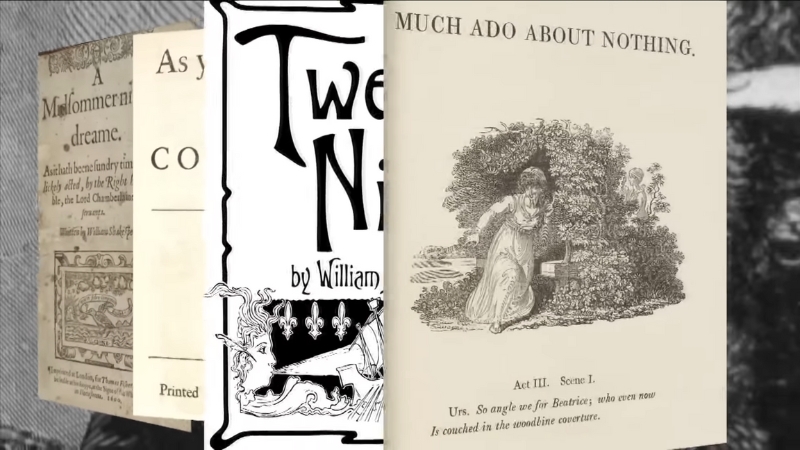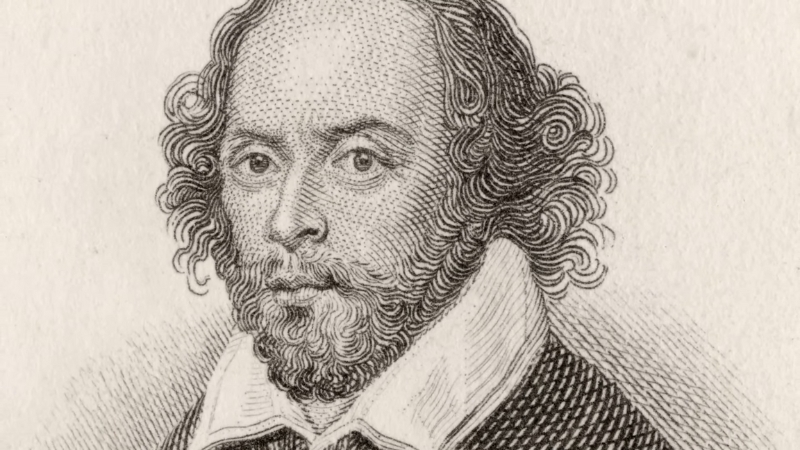Few writers have shaped language, emotion, and human imagination like William Shakespeare. His words, written more than four centuries ago, still capture what it means to love, struggle, dream, and lead.
The goal of this guide is simple: to gather more than 130 of his best lines and organize them by theme, so anyone, from students to writers, teachers, or everyday readers, can use them meaningfully.
We prepared quotations grouped by Love, Life, Power, Fate and Time, Friendship and Loyalty, Wisdom and Wit, and Mortality and Meaning.
Each line includes the play or poem it comes from, with occasional quick notes for clarity. All are public domain, so feel free to quote, annotate, or reuse them as needed.
How to Use This Guide

You can use these quotations in multiple ways:
At the end, you’ll find tips for adapting quotes and links to Folger, Globe Education, and MIT’s Complete Works, all useful for verifying context or comparing editions.
Love
Love is the heartbeat of Shakespeare’s writing. He showed it as reckless, selfless, funny, and tragic, all at once.
- “The course of true love never did run smooth.” – A Midsummer Night’s Dream
- “Love looks not with the eyes, but with the mind.” – A Midsummer Night’s Dream
- “Love is not love which alters when it alteration finds.” – Sonnet 116
- “Shall I compare thee to a summer’s day?” – Sonnet 18
- “My bounty is as boundless as the sea, my love as deep.” – Romeo and Juliet
- “But soft, what light through yonder window breaks?” – Romeo and Juliet
- “Thus with a kiss I die.” – Romeo and Juliet
- “If music be the food of love, play on.” – Twelfth Night
- “I do love nothing in the world so well as you.” – Much Ado About Nothing
- “The sight of lovers feedeth those in love.” – As You Like It
- “Who ever loved that loved not at first sight?” – As You Like It
- “Speak low, if you speak love.” – Much Ado About Nothing
- “She loved me for the dangers I had passed.” – Othello
- “I had rather hear my dog bark at a crow than a man swear he loves me.” – Much Ado About Nothing
- “Journeys end in lovers meeting.” – Twelfth Night
- “For where thou art, there is the world itself.” – Henry VI, Part 2
- “My heart is ever at your service.” – Timon of Athens
- “The more I give to thee, the more I have.” – Romeo and Juliet
- “Love sought is good, but given unsought is better.” – Twelfth Night
- “I know a bank where the wild thyme blows.” – A Midsummer Night’s Dream
- “Doubt thou the stars are fire.” – Hamlet
- “I will wear my heart upon my sleeve.” – Othello
- “O, learn to read what silent love hath writ.” – Sonnet 23
- “So long as men can breathe, or eyes can see, so long lives this.” – Sonnet 18
- “My love is thine to teach.” – Othello
- “For you, in my respect, are all the world.” – The Merchant of Venice
- “I like your silence; it the more shows off your wonder.” – The Winter’s Tale
- “I would not wish any companion in the world but you.” – The Tempest
- “When I saw you, I fell in love, and you smiled because you knew.” – Romeo and Juliet (commonly paraphrased)
- “Lovers can do their amorous rites by their own beauties.” – Romeo and Juliet
Life

Few could express human uncertainty better than Shakespeare. His reflections on fate, action, and purpose remain timeless.
- “To be, or not to be, that is the question.” – Hamlet
- “There is a tide in the affairs of men, which taken at the flood leads on to fortune.” – Julius Caesar
- “All the world’s a stage, and all the men and women merely players.” – As You Like It
- “What’s past is prologue.” – The Tempest
- “We are such stuff as dreams are made on.” – The Tempest
- “The web of our life is of a mingled yarn.” – All’s Well That Ends Well
- “There is nothing either good or bad, but thinking makes it so.” – Hamlet
- “Sweet are the uses of adversity.” – As You Like It
- “Our doubts are traitors, and make us lose the good we oft might win, by fearing to attempt.” – Measure for Measure
- “Men at some time are masters of their fates.” – Julius Caesar
- “Uneasy lies the head that wears a crown.” – Henry IV, Part 2
- “Things won are done, joy’s soul lies in the doing.” – Troilus and Cressida
- “There is a divinity that shapes our ends.” – Hamlet
- “Brevity is the soul of wit.” – Hamlet
- “Suit the action to the word, the word to the action.” – Hamlet
- “Give every man thy ear, but few thy voice.” – Hamlet
- “Better three hours too soon than a minute too late.” – The Merry Wives of Windsor
- “Wisely and slow; they stumble that run fast.” – Romeo and Juliet
Power
View this post on Instagram
Power fascinated Shakespeare as much as love. He wrote about its corruption, ambition, and fragility.
- “Look like the innocent flower, but be the serpent under it.” – Macbeth
- “I have no spur to prick the sides of my intent, but only vaulting ambition.” – Macbeth
- “Fair is foul, and foul is fair.” – Macbeth
- “Let me have men about me that are fat.” – Julius Caesar
- “Cry ‘Havoc!,’ and let slip the dogs of war.” – Julius Caesar
- “There’s daggers in men’s smiles.” – Macbeth
- “Thrift, thrift, Horatio.” – Hamlet
- “O, that a man might know the end of this day’s business ere it come.” – Julius Caesar
- “Such fear of my condition.” – King Lear
- “Now is the winter of our discontent.” – Richard III
- “Conscience is but a word that cowards use.” – Richard III
- “The abuse of greatness is when it disjoins remorse from power.” – Julius Caesar
- “A little water clears us of this deed.” – Macbeth
- “I am constant as the northern star.” – Julius Caesar
- “Had I so lavish of my presence been.” – Henry IV, Part 1
- “If it were done when ’tis done.” – Macbeth
- “When sorrows come, they come not single spies, but in battalions.” – Hamlet
- “O, full of scorpions is my mind.” – Macbeth
- “All’s well that ends well.” – All’s Well That Ends Well
Fate and Time
For Shakespeare, time was both healer and destroyer. He used it to explore patience, destiny, and consequence.
- “Time’s glory is to calm contending kings.” – Lucrece
- “Make use of time, let not advantage slip.” – Venus and Adonis
- “Defer no time, delays have dangerous ends.” – Henry VI, Part 1
- “There is special providence in the fall of a sparrow.” – Hamlet
- “O brave new world that has such people in it.” – The Tempest
- “The whirligig of time brings in his revenges.” – Twelfth Night
- “Come what come may, time and the hour runs through the roughest day.” – Macbeth
- “What’s done cannot be undone.” – Macbeth
- “O time, thou must untangle this, not I.” – Twelfth Night
- “The wheel is come full circle.” – King Lear
- “Tomorrow, and tomorrow, and tomorrow, creeps in this petty pace.” – Macbeth
Friendship and Loyalty

He portrayed friendship as fragile yet sacred. His plays often tested loyalty through love, betrayal, and forgiveness.
- “I am constant in my love to thee.” – Julius Caesar
- “I am your spaniel.” – A Midsummer Night’s Dream
- “A friend should bear a friend’s infirmities.” – Julius Caesar
- “Good night, good night. Parting is such sweet sorrow.” – Romeo and Juliet
- “I am a fool to weep at what I am glad of.” – The Merchant of Venice
- “I am not bound to please thee with my answers.” – The Merchant of Venice
- “You shall find that I am your friend.” – Coriolanus
- “Bear a fair presence and put off these frowns.” – Romeo and Juliet
- “Give me your hand.” – Much Ado About Nothing
- “O, wonderful, wonderful, and most wonderful wonderful.” – As You Like It
Friendship in Shakespeare’s world was often a test of moral courage and restraint.
Wisdom and Wit
Some of Shakespeare’s best lines blend humor and moral clarity. He could pack irony, warning, and advice into a single phrase.
- “The better part of valor is discretion.” – Henry IV, Part 1
- “Love all, trust a few, do wrong to none.” – All’s Well That Ends Well
- “Nothing will come of nothing.” – King Lear
- “O, beware, my lord, of jealousy.” – Othello
- “Our remedies oft in ourselves do lie.” – All’s Well That Ends Well
- “No legacy is so rich as honesty.” – All’s Well That Ends Well
- “Though she be but little, she is fierce.” – A Midsummer Night’s Dream
- “Some rise by sin, and some by virtue fall.” – Measure for Measure
- “Truth is truth to the end of reckoning.” – Measure for Measure
- “Sweet mercy is nobility’s true badge.” – Titus Andronicus
- “All that glisters is not gold.” – The Merchant of Venice
- “Be not afraid of greatness.” – Twelfth Night
- “How poor are they that have not patience.” – Othello
- “There is no darkness but ignorance.” – Twelfth Night
- “Cowards die many times before their deaths.” – Julius Caesar
- “Fortune brings in some boats that are not steered.” – Cymbeline
- “To hold, as ’twere, the mirror up to nature.” – Hamlet
- “Heat not a furnace for your foe so hot that it do singe yourself.” – Henry VIII
These lines show how Shakespeare’s wit often carried quiet warnings about pride, envy, and self-deception.
Mortality and Meaning
@m7trending I can quote for you shakespeare. #museveni #fypdongggggggg #fypシ ♬ original sound – Museveni Clips
When Shakespeare wrote about death, he did it with clarity and acceptance rather than fear. His reflections still move modern readers because they feel true.
- “Out, out, brief candle.” – Macbeth
- “The rest is silence.” – Hamlet
- “Golden lads and girls all must, as chimney sweepers, come to dust.” – Cymbeline
- “Life’s but a walking shadow.” – Macbeth
- “O, that way madness lies.” – King Lear
- “The miserable have no other medicine but only hope.” – Measure for Measure
- “Let me be that I am and seek not to alter me.” – Much Ado About Nothing
- “All that lives must die, passing through nature to eternity.” – Hamlet
- “So wise so young, they say do never live long.” – Richard III
- “Full fathom five thy father lies.” – The Tempest
- “Farewell, a long farewell, to all my greatness.” – Henry VIII
Why These Lines Still Matter
Shakespeare’s words survive because they fit life, no matter the century.
Cultural Literacy
His phrases live in our speech, politics, and art. When someone says “the world’s a stage” or “all that glitters is not gold,” they’re quoting him, whether they know it or not.
Versatility
The lines work anywhere: in a wedding toast, a thesis epigraph, or a motivational speech. Their rhythm and imagery give them power.
Depth
Each line changes meaning depending on where you stand in life. That’s part of their genius. “To be, or not to be” feels one way to a student, another to a soldier, and another to an aging parent.
How to Adapt for Classroom, Speeches, or Essays

Here are a few ways to make the most of Shakespeare’s lines in modern contexts:
Group by Rhetorical Purpose
- Inspiration: “There is a tide in the affairs of men.”
- Warning: “O, beware, my lord, of jealousy.”
- Confession: “I am a fool to weep at what I am glad of.”
- Persuasion: “Men at some time are masters of their fates.”
Pair Quotes with Tension
- Try matching Orsino’s dreamy “If music be the food of love” with Jaques’s skeptical “All the world’s a stage.”
- It sparks discussion about romanticism and realism.
Add Context when Quoting
- Include the speaker and scene: “As Hamlet says while holding the skull of Yorick…”
- It helps the audience connect emotion with circumstance.
Always Verify the Wording
- Use Folger Shakespeare Library or MIT’s Complete Works to double-check punctuation or old spelling before citing.







